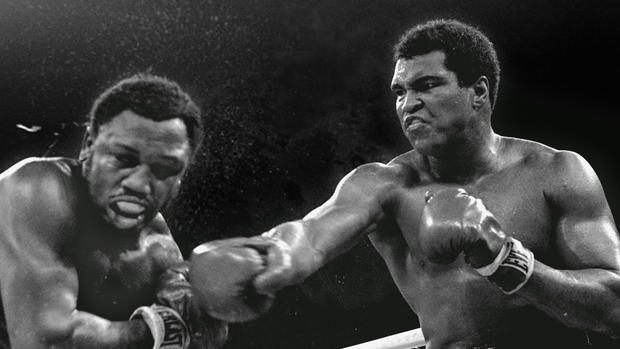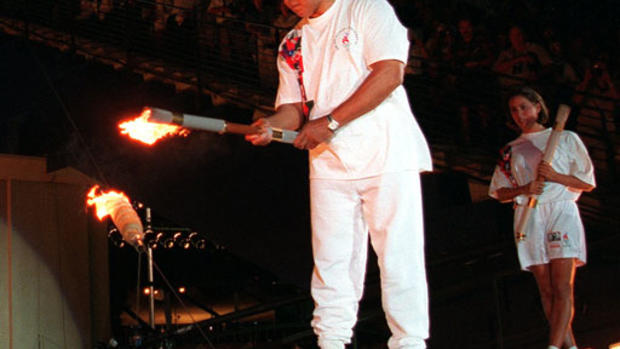Muhammad Ali, boxing legend and cultural icon, dies
Muhammad Ali, a three-time world heavyweight boxing champion who became a cultural icon, died at age 74 after a brief hospitalization, a spokesman confirmed early Saturday.
"Muhammad Ali's funeral will take place in his hometown of Louisville, KY," spokesman Bob Gunnell said in a statement. "The Ali family would like to thank everyone for their thoughts, prayers, and support and asks for privacy at this time."
Never humble, always bold in style and substance, Muhammad Ali burst onto the boxing world's stage with an unorthodox style and a sharp tongue that moved as fast as his dancing feet.
"I'm gonna float like a butterfly and sting like a bee. His hands can't hit what his eyes can't see," Ali famously said.
Born Cassius Marcellus Clay, Jr. in Louisville, Kentucky, on January 17, 1942, he said he learned to fight as a child after someone stole his bicycle. He first captured the world's attention as an 18-year-old in 1960 with a gold-medal boxing victory at the Olympics in Rome. He was just three months out of high school.
As a teenager, he'd call boxing coaches to tell them that one day he would be their world champion. And, indeed, in 1964 - at the age of 22 - he defeated big Sonny Liston to become the world heavyweight champion, the youngest boxer ever to hold the title.
It was in this spotlight that Cassius Clay announced he was changing his name and converting to Islam because he said the religion simply appealed to him.
Muhammad Ali remained the world heavyweight champion from 1964 until 1967. But then his dream career came to a halt when he failed to show up at the draft board, saying he was a conscientious objector to the Vietnam War and that fighting was against his religion. He was arrested and stripped of both his boxing license and his heavyweight title.
"I'm not allowed to fight in America, I'm not allowed to leave America," he said. "I've been persecuted before prosecuted."
Ali was forced out of the ring for three years until the Supreme Court overturned his draft evasion conviction. But he might have lost some of his best boxing years.
At Madison Square Garden in 1971, in what was billed as "the fight of the century," Ali's comeback bid was stopped by longtime nemesis Joe Frazier. It was Ali's first professional defeat and it would take him three years and several more bruising fights to come back.
In 1974, Ali regained the heavyweight title in a highly publicized bout in Zaire known as "The Rumble in the Jungle." His famous "rope-a-dope" four-punch combination knocked out George Foreman, who was known as one of the hardest punchers of all time.
A year later, he garnered worldwide headlines again when he faced Frazier in a fight dubbed "The Thrilla in Manilla." Ali triumphed after an exceptionally brutal 14 rounds.
Then in 1978, Ali lost and once again regained the crown from Leon Spinks.
Ali was no longer invincible and took plenty of punishment before finally calling it quits in 1981. He was 39 years old, with a pro record of 56 wins and five defeats.
Just a few years into retirement - at 42 - Ali had to face perhaps the biggest fight of his life when he was diagnosed with Parkinson's disease. The most graceful of boxers slowly lost control of his body. It became hard to walk and even harder to speak.
During a "60 Minutes" filming, Ali tried to do an interview, then walked away because, he told Ed Bradley later, he did not want to be pitied.
Yet the fighter's instinct never left Ali. He playfully jabbed at his fans from all walks of life, including Fidel Castro. He did the near-impossible when he met with Saddam Hussein and negotiated the release of people who were being used by the Iraqi dictator as human shields in the weeks before the 1990 Gulf War.
Ali's stature in the pantheon of sports heroes led to an impressive array of honors over the years. He lit the Olympic flame to open the 1996 Summer Games in Atlanta, and in 1999 Sports Illustrated named him Sportsman of the Century.
In a White House ceremony in 2005, President George W. Bush presented Ali with the Presidential Medal of Freedom, the nation's highest civilian award.
"When you say, 'The Greatest of All Time' is in the room, everyone knows who you mean," the president said. "It's quite a claim to make -- but as Muhammad Ali once said, 'It's not bragging if you can back it up.' And this man backed it up."
Never one to keep his opinions quiet, Ali spoke out during the current presidential campaign against Donald Trump's call to ban Muslims from entering the United States.
"True Muslims know the ruthless violence of so-called Islamic Jihadists goes against the very tenets of our religion," Ali, one of the most famous Muslim figures in the world, said in a statement. "I believe that our political leaders should use their position to bring understanding about the religion of Islam and clarify that these misguided murderers have perverted people's views on what Islam really is."
The Muhammad Ali Center, which he founded in his hometown of Louisville, promotes Ali's humanitarian and educational mission and showcases his legacy as a boxer.
Despite the terrible physical toll taken by Parkinson's disease, Ali made an appearance at an event there in October 2015 along with two of his former opponents, George Foreman and Larry Holmes, as Sports Illustrated renamed its Legacy Award in his honor.
His unwavering courage in the face of his toughest enemy transformed Ali into another kind of champion -- one who did not go down easily and who stands ever more as an icon of triumph.

